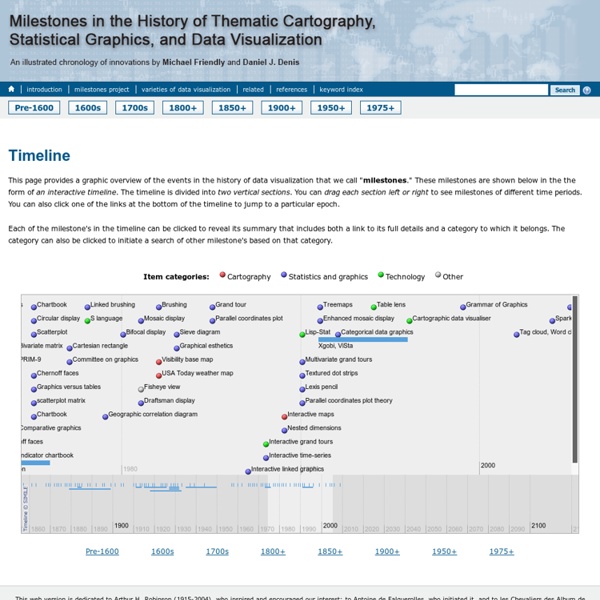GeoDa on Github
GeoDa Release This GeoDa 1.12 is the most current version of GeoDa with new features. We found it to be stable but if you encounter a bug, please let us know.
2018
Managing 100 Digital Humanities Projects: Digital Scholarship & Archiving in King’s Digital Lab James Smithies, King's College London; Carina Westling, King's College London; Anna-Maria Sichani, King's College London; Pam Mellen, King's College London; Arianna Ciula, King's College London Modelling Medieval Hands: Practical OCR for Caroline Minuscule Brandon W.
RAWGraphs
RAW Graphs is an open source data visualization framework built with the goal of making the visual representation of complex data easy for everyone. Primarily conceived as a tool for designers and vis geeks, RAW Graphs aims at providing a missing link between spreadsheet applications (e.g. Microsoft Excel, Apple Numbers, OpenRefine) and vector graphics editors (e.g.
The 38 best tools for data visualization
Data isn't a thing that's easy for the average person to grasp. While some can look through a spreadsheet and instinctively find the information they need within a mass of figures, the rest of us need a little help, and that's where data visualisation can be a real help. For the designer, the challenge is not only in rendering a set of data in an informative way, but also in presenting it so that it that stands out from the mass of competing data streams.
Field Notes: Building Data Dictionaries – Haystacks
The scariest ghost stories I know take place when the history of data — how it’s collected, how it’s used, and what it’s meant to represent — becomes an oral history, passed down as campfire stories from one generation of analysts to another like a spooky game of telephone. These stories include eerie phrases like “I’m not sure where that comes from”, “I think that broke a few years ago and I’m not sure if it was fixed”, and the ever-ominous “the guy who did that left”. When hearing these stories, one can imagine that a written history of the data has never existed — or if it has, it’s overgrown with ivy and tech-debt in an isolated statuary, never to be used again.
RStudio Preview - RStudio
RStudio v1.2.907-1 Preview — Release Notes A preview release of RStudio v1.2.907-1 is now available for testing and feedback. This early preview of RStudio 1.2 includes the following features: Author and preview D3 visualizations and embed them in R Notebooks, via the r2d3 package.Improved support for SQL; author, run and preview SQL query results.Integrated support for the reticulate package (call Python code from within R sessions and R Notebooks).New testing tools; run testthat and shinytest tests and view results.Support for PowerPoint presentations in R Markdown.Integration with the keyring package to store secrets such as database passwords.Integration with the Plumber package; author and test APIs inside RStudio and publish them to RStudio ConnectSupport for background jobs; run any R script in the background, view progress and output, and collect results when complete.An upgraded rendering engine based on Chromium, which improves performance and visual quality. Desktop Version
There’s no such thing as a “tech person” in the age of AI
When I was an undergrad at MIT, and later an engineer in Silicon Valley, I always felt like a bit of a black sheep because of my perpetual desire to straddle technology and the humanities. That went against the culture of both worlds, indicative of a broader impulse globally to separate the two. In hindsight, this separation hasn’t served us so well. As Henry Kissinger wrote in the June 2018 issue of the Atlantic: “The Enlightenment started with essentially philosophical insights spread by a new technology.
Writing History in the Digital Age
How are electronic databases and text-analysis tools changing how historians research and write about the past? Are we finding more “needles in the haystack” that we otherwise might not have noticed? Ansley Erickson launches this section with “Historical Research and the Problem of Categories: Reflections on 10,000 Digital Note Cards,” which richly illustrates how using a relational database package reshaped her dissertation source-work and writing process and led her to reflect on broader questions of historical categorization. Reflecting on their long-term collaboration, Kathryn Kish Sklar and Thomas Dublin describe the transformation of their intellectual goals, technology, funding, and global audience, in “Creating Meaning in a Sea of Information: The Women and Social Movements Web Sites.”



